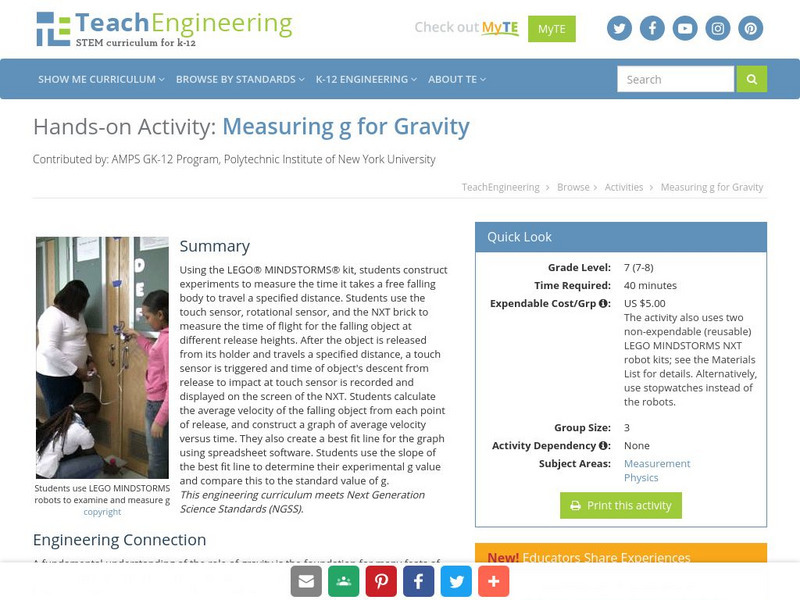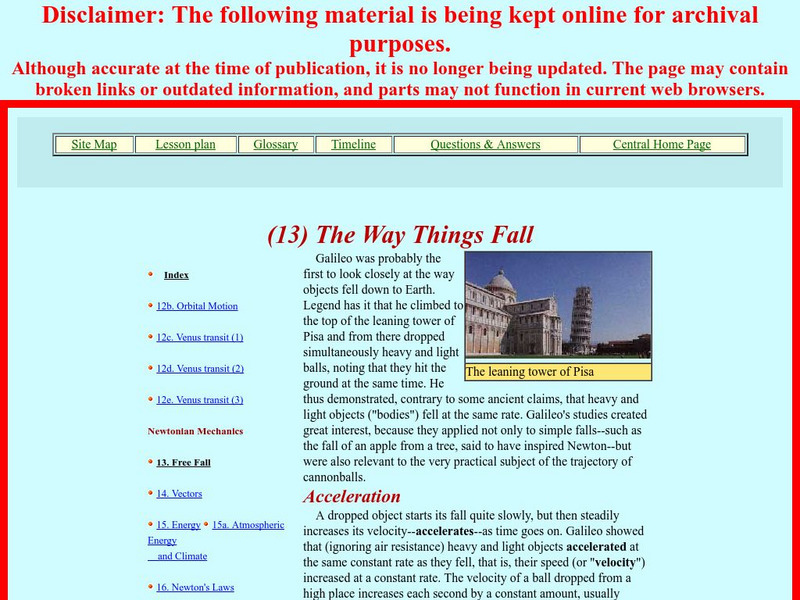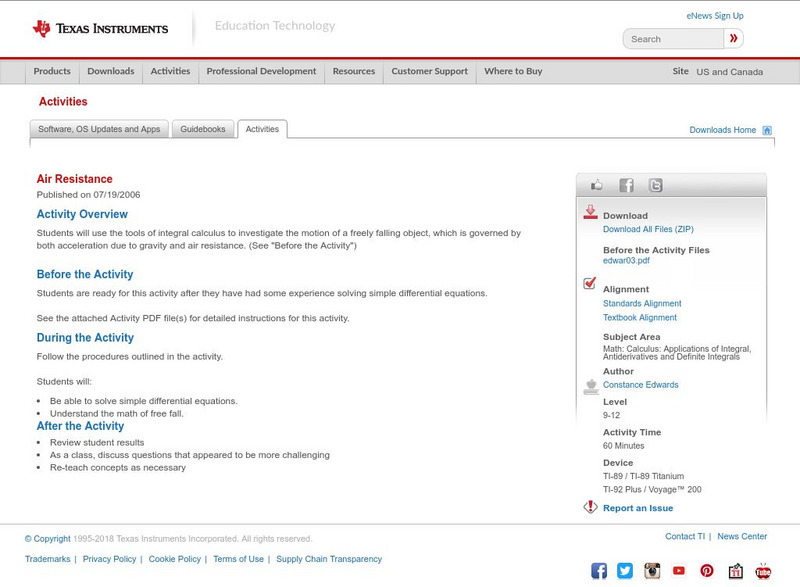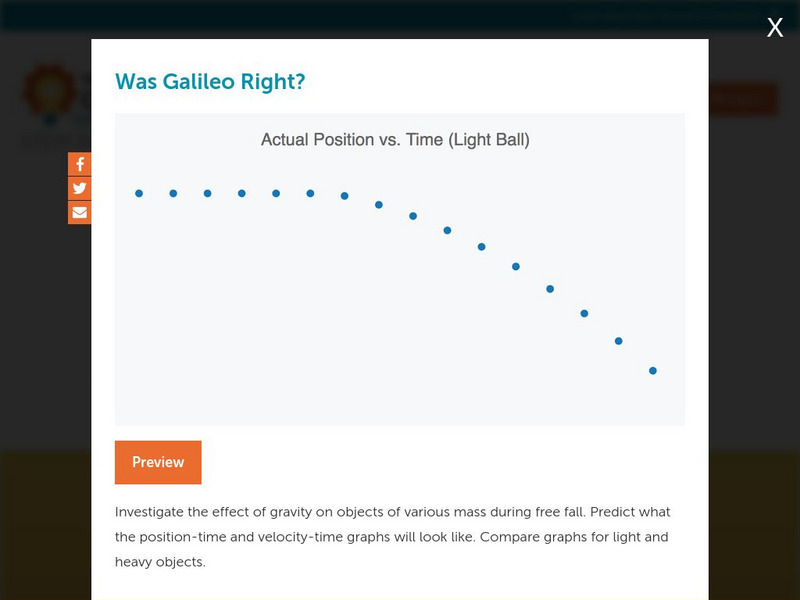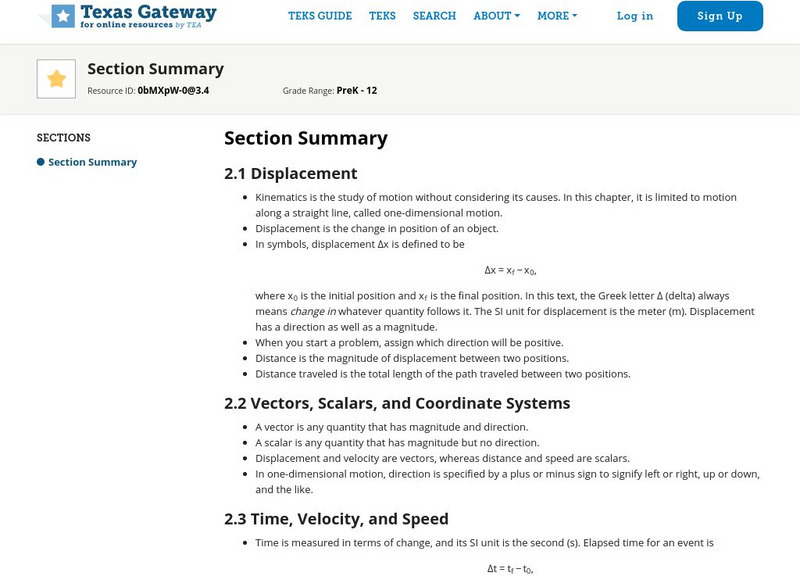American Association of Physics Teachers
Com Padre Digital Library: Open Source Physics: Free Fall Air Resistance Model
A Java-based simulation where students can observe what happens to a free-falling object, with and without air resistance. Controls allow the user to adjust settings and the results are graphed as the simulation progresses.
Texas Education Agency
Texas Gateway: Kinematics: Falling Objects
By the end of this section, you will be able to describe the effects of gravity on objects in motion, describe the motion of objects that are in free fall, and calculate the position and velocity of objects in free fall.
Georgia State University
Georgia State University: Hyper Physics: Energy of Falling Object
This site is from the Physics Department at Georgia State University. The reliance upon the law of conservation of energy as an approach to problem-solving is presented and encouraged. It is modeled through a problem involving a...
Physics Classroom
The Physics Classroom: 1 D Kinematics: Representing Free Fall by Graphs
In this physics tutorial, the motion of a free-falling motion will be represented using position versus time and velocity versus time graphs.
OpenStax
Open Stax: Falling Objects
In the following interactive module, students will describe the effects of gravity on objects in motion. They will also describe the motion of objects that are in freefall and calculate the position and velocity of objects in freefall.
Physics Classroom
The Physics Classroom: Introduction to Free Fall
A lesson on free fall covers the fact that free-falling objects do not encounter air resistance and all free-falling objects (on Earth) accelerate downwards at a rate of approximately 10 m/s/s (to be exact, 9.8 m/s/s).
Physics Classroom
The Physics Classroom: Acceleration
Topics covered include what acceleration is, the difference between constant and non-constant acceleration, acceleration in a free-falling object, the equation used to compute acceleration, and the difference between positive and...
Vision Learning
Visionlearning: An Experiment: Acceleration During Free Fall
Animated simulation re-enacts Galileo's experiment of dropping objects off the Leaning Tower of Pisa.
Physics Classroom
The Physics Classroom: Free Fall and Air Resistance
This lesson in high school physics on Newton's Second Law of Motion provides a discussion of free fall and air resistance, and answers, "Why do objects which encounter air resistance ultimately reach a terminal velocity?" and "In...
Physics Classroom
The Physics Classroom: Elephant & Feather (Free Fall)
A demonstration involving an elephant and a feather and explanation of why all objects maintain the same acceleration in the state of free fall without any air resistance.
Physics Classroom
The Physics Classroom: 1 D Kinematics: How Fast? And How Far?
Students understand the physics of a free falling object through these illustrated example problems.
Texas Instruments
Texas Instruments: Falling Down
In this activity, students will determine the average speed of a falling object. They will observe whether or not changing the mass and keeping the same shape have an effect on the average speed of the object.
Department of Defense
Do Dea: Free Fall Constants for Earth
When you work with equations that show position, velocity, acceleration of objects that are flying or falling through the air, you will be using the constant that is the acceleration due to gravity. View formulas, explanations, and...
Texas Instruments
Texas Instruments: Falling Objects
In this activity, Students can use a Motion Detector to measure distance and velocity.
TeachEngineering
Teach Engineering: Measuring G
Using the LEGO MINDSTORMS NXT kit, students construct experiments to measure the time it takes a free falling body to travel a specified distance. Students use the touch sensor, rotational sensor, and the NXT brick to measure the time of...
Georgia Department of Education
Ga Virtual Learning: Linear Motion
A learning module where students gain an understanding of the relationships between the different kinds of motion. Students will be able to explain free-fall motion and use kinematics equations to calculate problems involving falling...
TeachEngineering
Teach Engineering: How Do Things Fall?
Students learn more about forces by examining the force of gravitational attraction. They observe how objects fall and measure the force of gravitational attraction upon objects.
NASA
Nasa: The Way Things Fall
This site from NASA compares free falling motion to falling with air resistance. Discusses Galileo's experiment. Explains why we believe all objects free fall with the same acceleration.
Texas Instruments
Texas Instruments: Air Resistance
Use the TI-89 to investigate the effect of air resistance on a free-falling object. Examples in the activity use calculator screenprints and keystroke instructions to demonstrate the use of the calculator to solve these problems....
CK-12 Foundation
Ck 12: Physical Science: Acceleration Due to Gravity
[Free Registration/Login may be required to access all resource tools.] Acceleration due to gravity and why falling objects with different masses accelerate at the same rate.
Concord Consortium
Concord Consortium: Was Galileo Right?
Investigate the effect of gravity on objects of various mass during free fall. Predict what the position-time and velocity-time graphs will look like. Compare graphs for light and heavy objects.
Texas Education Agency
Texas Gateway: Kinematics Section Summary
This is a summary of the main topics for AP Physics Chapter 2 Kinematics. These include Displacement; Vectors, Scalars, and Coordinate Systems; Time, Velocity, and Speed; Acceleration; Motion Equations for Constant Acceleration in One...
Physics Classroom
The Physics Classroom: 1 D Kinematics: The Big Misconception
An introduction to the ideas behind the misconception and misunderstanding of why all objects accelerate at the same rate. This explanation involves the concepts of force and mass.
Khan Academy
Khan Academy: Freefall Review
Review the key concepts and skills for acceleration due to gravity, including analyzing motion of objects in freefall.








